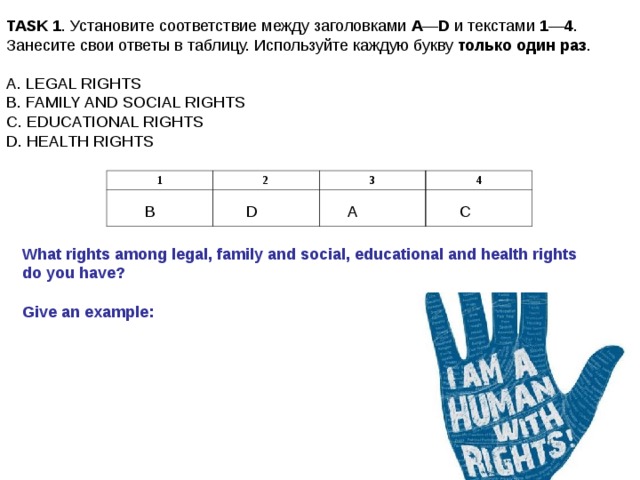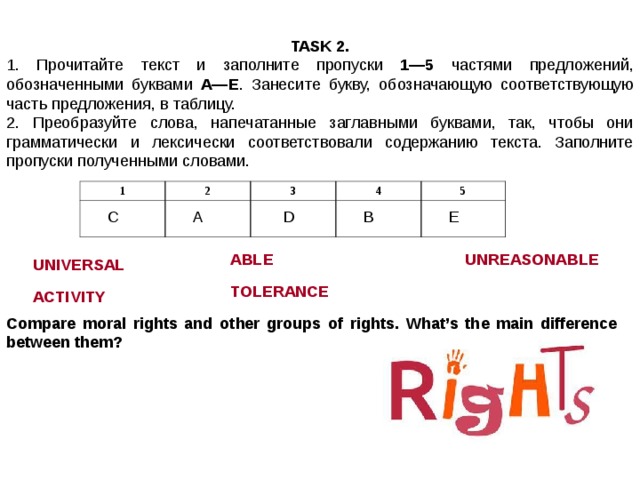NAME, SURNAME _____________________________
THEME: ______________________________________________________________________
TASK 1. Установите соответствие между заголовками А—D и текстами 1—4. Занесите свои ответы в таблицу. Используйте каждую букву только один раз.
A. LEGAL RIGHTS
B. FAMILY AND SOCIAL RIGHTS
C. EDUCATIONAL RIGHTS
D. HEALTH RIGHTS
Have you ever asked yourself what a teenager's rights are? It is easy to feel that teens have no power over anything - including their own lives. However, teens have more rights than you think.
While family, social, health, legal and educational rights are not a full listing of a teenager's rights, they are some of the most basic ones.
1. Above all else, a teen has a right to be treated as a human being by friends, family and associates. This right extends to all, whether teen, toddler (ребенок, начинающий ходить) or elderly. Although it may often be on different levels, teens have the right of respect from others. A teen also has the right to a sustainable (устойчивый) lifestyle. Shelter, food and clothing are all basic rights that teens have. Of course, this doesn't mean that a teen has the right to the newest styles at the mall. A teen's right to clothing involves only what is necessary to protect him/her from the elements.
A teen also has the right to be loved. While some people have stronger families than others, each teen deserves someone around to provide support and comfort.
One of the rights that a teenager has is the right to be safe from harm. This includes all types of harm from physical (such as child abuse or bullying), emotional (such as threats and insults(оскорбления)) or any other type.
2. Teens have many these rights in which their parents do not need to know about or consent to.
A teenager can be tested or treated for a sexually transmitted disease.
In many states, a teen at the age of 16 or 17 can abort a pregnancy.
Teens can receive a pregnancy test at any age.
A teenager can also have up to six mental health care appointments under certain circumstances.
A teenager can also seek drug counseling.
3. These rights can differ between states so be sure to check with your local authorities before assuming you have a right. In most states, a teen has the right to begin work at the age of 16. Teens can have a local paper route-type job as early as the age of 12. Unfortunately, teens don't have the formal right to property until they are 18. The reason for this is that if something were to happen to a teen's property (such as theft of a bike or car), the parents would be responsible for taking recourse (спасательное средство) - not the teen.
However, in certain circumstances (определенные обстоятельства), a teenager can emancipate (освобождать) themselves from their parents. What this means is that a teen is completely independent of their parents due to extreme circumstances and is legally allowed to fend (заботиться) for themselves. In this circumstance, the teen is responsible for providing for his/her life.
4. All teens have the right to an education. While not all states agree on curriculum, they all agree that a teen has the fundamental right to be taught and learn. This includes having the proper resources, environment, and facilities to learn the basic levels of education provided to a teenager.
Teens 16 and older also have the right to decide if they would like to drop out of high school. In most states, a parent is required to agree to this decision.
Teens also have the right to choose some portion of their high school curriculum (учебный план) outside of required courses. A teen has the right to have some say in the elective courses that they take.
What rights among legal, family and social, educational and health rights do you have?
Give an example: _______________________________________________________________
_____________________________________________________________________________
_____________________________________________________________________________
TASK 2.
Прочитайте текст и заполните пропуски 1—5 частями предложений, обозначенными буквами A—E. Занесите букву, обозначающую соответствующую часть предложения, в таблицу.
Преобразуйте слова, напечатанные заглавными буквами, так, чтобы они грамматически и лексически соответствовали содержанию текста. Заполните пропуски полученными словами.
The human rights are 1_____________________________– male and female, young and old, rich and poor, regardless of our background, where we live, what we think or what we believe. This is what makes human rights ‘______________' (UNIVERSE).
Human rights cover virtually every area of human life and _____________ (ACTIVE). They include civil and political rights, such as freedom of speech and freedom from torture (жестокое обращение). They also include economic, social and cultural rights, 2_________________________. Some rights apply to individuals, such as the right to a fair trial (суд): these are called individual rights. Others apply to groups of people, such as women and children: these are called collective rights.
The Universal Declaration of Human Rights, 3____________________________, sets out the basic rights and freedoms of all men, women and children.
Rights also describe what is lawful: that is, some rights may be laid down in law. If you have a legal right to something, you may be __________ (ABILITY) to defend it in court.
In many situations, though, rights exist but are not covered by law. These rights are often called moral rights and are based on people's sense of what is fair or just.
Respect for human rights helps build strong communities, based on equality and 4____________ (TOLERANT), in which every person has an opportunity to contribute. Of course, ________________________ the responsibility that we respect the rights of others.
Over the last few hundred years, ideas about human rights have developed as a way of 5____________________. People everywhere seek physical security, freedom from suffering and freedom from ____________ (REASON) restraint (ограничение) for themselves and their families. They seek equality (равенство) and fairness, the opportunity to reach their potential and acknowledgment of their inherent dignity (присущее достоинство).
A. such as the rights to health and education
B. having others respect our human rights comes with
C. the same for all people everywhere
D. agreed to by the nations of the world on 10 December 1948
E. expressing some of those values
Compare moral rights and other groups of rights. What’s the main difference between them?
__________________________________________________________________________
__________________________________________________________________________
TASK 3. WORK IN PAIRS
Complete the scheme “Humans everywhere have the right” using the definitions
1. ______________________________
the condition or right of being able or allowed to do, say, think, etc. whatever you want to, without being controlled or limited
2. ______________________________
the right of people to take in marriage and to give the birth to a baby
3. ______________________________
the right to be free from secret surveillance (наблюдение) and to determine whether, when, how, and to whom, one's personal or organizational information is to be revealed
4. ______________________________
the right of people to express their opinions publicly without governmental interference (вмешательство)
5. ______________________________
a right that allows a person to have a job at any place of employment without being forced to join a union as a condition of employment.

TASK 4. WORKS IN GROUPS
Complete the table
WHAT CAN YOU DO WHEN YOU …?
| TURN 14 | TURN 15 | TURN 16 |
| 1 | 1 | 1 |
| 2 | 2 | 2 |
| 3 | 3 | 3 |

1. You can drive a motorcycle
2. You can be a witness to someone else’s will
3. You can be employed
4. You can agree to donate your own body organs (after death)
5. You can consent (давать согласие) to your own medical treatment (лечение)
6. You can leave school
7. You can enter into a civil law marriage with the consent of parents or guardians
8. You can consent to donating blood
9. You can apply for a Child Support Grant for your own child or younger siblings (родные братья и сестры) if you’re the primary caregiver (кормилец)
TASK 5. WATCH A VIDEO.
Decide whether these statements are True or False
Parental Rights True-False Quiz
1. True or False: A mother in Minnesota was told that she could not access (предоставить) the medical records (медицинская карточка) of any of her children 11 years old or older, or discuss her child's health with the physician (терапевт), without obtaining her child's permission.
2. True or False: In most states, you will be denied access to library information about your children, including the titles of books which are accumulating late fees.
3. True or False: You have a legal right to know if your teenage children will receive or have received medical treatment (лечение) through the public schools.
4. True or False: As a parent, you have the right to visit your children on public school grounds, for instance to have lunch with your child.
5. True or False: If your child is in a non-life threatening situation, a doctor cannot perform any medical procedures on him/her without first getting your permission.
6. True or False: If you are an American parent, your child's doctor must have your approval before giving your child a vaccination.
7. True or False: A mother in Illinois was twice refused her request to opt her daughter out of sexual education lectures that she found objectionable (нежелательный).
8. True or False: If you make a payment to a Community College for your minor child's tuition (обучение), you are entitled to a receipt (дает право на получение чека).
9. True or False: A mother was refused her 13-year-old daughter's grades when she enrolled her in an algebra class.
10. True or False: We don't really need a Parental Rights Amendment (поправка) to the United States Constitution.
TASK 6.
What associations do you have with word “RIGHT”? Write one word or phrase for each letter.
R __________
I __________
G __________
H __________
T __________


























